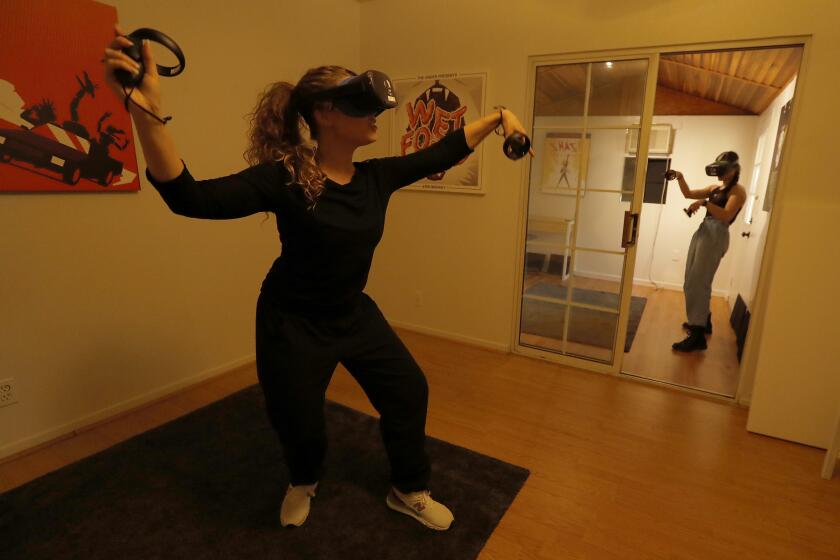The scariest movie in quarantine is actually a game unfolding on Instagram
“Arcana,” a new game with an old Los Angeles murder at its center, is reviving the ARG (alternate-reality game) format by utilizing Instagram.
Likening the coronavirus era to a horror story is no great leap. An invisible, deadly killer, angry mobs, supply shortages, financial bedlam — even those lucky enough to survive this moment relatively unscathed can no doubt sense it is one of high tension and drama.
So maybe the escape we’ve all been needing was a narrative game that uses popular social media tools to recall one of the most gruesome murders to occur within Los Angeles city limits, a horror so great that it became national news, inspired a folk song and specifics of which, involving the harming of a child at the hands of a teenager, are chilling to read. While not many today remember the details of the tragic fate that befell a young Marion Parker in 1927, this paper has stated that few crimes “have been more revolting.”
Wait. No. That’s not the feel-good story this moment is lacking, It is, however, the one “Arcana” has given us.
Recognizing that many feel the world is currently out of sorts, as well as the damage one’s own mind can do when left alone, “Arcana” is certainly not trying to be “Animal Crossing,” Yet over the last three weeks the game, largely constructed in the days after stay-at-home initiatives went into place, has populated a not-so-hidden corner of Instagram with a tale of murder and mystery while also hitting on the terrors of isolation, all the while cleverly using the social media platform as a playing field.
Puzzles are posted as images, and sometimes they’re hidden in the background of selfies or in the frames of Instagram Live dance party videos. All are meant to reflect the increasingly fragile mind of a young woman in quarantine.
In turn, “Arcana” has become the rare ARG (alternate-reality game) that feels not just approachable but welcoming to those unfamiliar with the hidden-puzzle medium. Its story is largely molded into the social media tools we already use, and with new Instagram posts arriving regularly Wednesday through Sunday, those who want to skip a puzzle — or get stumped — are still able to advance. “Arcana” is as much a game as it is a story told largely through mobile video and photos.
Parts of “Arcana” can be scary. And throughout the first three weeks of the story, which is on track to wrap this weekend, our main character, a lonely young artist trying to reconnect with social media, didn’t always flash her smarts. But “Arcana” has offered a COVID-19-timed horror story that’s set in our present moment. Early on in particular it nodded to our real-life happenings, especially the helplessness and overwhelmed sensations that seem pervasive when trying to manage life during a pandemic.
Yet it is not a coronavirus story.
As “Arcana” has unfolded it has gradually taken on more allusions to paranormal and occult activity. Its timeliness stems from equally exploring vulnerability and desperation, and coupling that with our desire to constantly assign meaning to the world around us. “Arcana,” ultimately, is about the human attempt to create order out of chaos, exploiting our own voyeuristic desire to even find narrative strands in the Instagram posts of friends, loved ones and anonymous neighbors. Key to its appeal, the game understands that posting on social media is an act of performance, and one full of deceptions large and small.
“I feel like we’re all kind of creeping on people on social media and they’re creeping on us,” says Eva Anderson, a writer/producer on the project, whose recent credits include an episode of AMC’s “Dispatches From Elsewhere,” a series itself inspired by an underground game that intersected with real people, places and locations.
Los Angeles studio Tender Claws brings live theater to virtual reality with actors at home during coronavirus. It’s a new form of theater.
“What if we made a narrative that comes just from spying on somebody you don’t know while they’re going through something? We wanted it to be about quarantine without being about it,” Anderson says. “Nobody wants to talk about quarantine in artwork right now, but there are these very universal emotions within it that correspond with other life changes. We realized we could be in that world without talking about COVID.”
The game began by introducing us to the Instagram account of Jade, a self-described “humanoid” with a penchant for bad poetry and metaphorical dreams. We meet Jade in a moment of vulnerability. Robin, Jade told us in an an Instagram video on May 5, has left her for the Pacific Northwest. The relationship between Jade and Robin isn’t spelled out at first, but we see early on that Jade is hurting, and the intimacy of a selfie as well as the casual, improvisational delivery of actress Nerea Duhart, is designed to foster an immediate connection.
Jade is a character who, in a time of quarantine, is reeling from the dissolution of a relationship and asking for friends. Or, players rather. Tommy Honton, an escape-room veteran and co-founder of the Museum of Selfies, art-directed the puzzles, some of which are twists on Picross brainteasers, and others that have players stringing together abstract images.
While some will have players using free web tools to distort images or sound files, by centering the game on Instagram it ultimately feels more like a four-week horror film told in installments rather than a series of puzzles. “Arcana” doesn’t try to mold an existing format onto the mobile phones; it recognizes the inherent forward momentum of smartphone-based media.
Thus, by using Instagram as a home base, it avoids a common ARG pitfall — almost everyone who has played one has a tale of an experience gone wrong when trying to make the world a game board.
“I remember the first time I ever played an ARG I was convinced there was something over a mountain and I literally went hiking over a mountain,” says Anderson. There wasn’t anything related to the game over the mountain.
Where “Arcana” is going is defined, and newcomers can easily get caught up via summaries on the game’s site or simply by spending a little time with Jade’s Instagram. In terms of play, there are day-to-day moments that are malleable.
“The weekly structure, overall plot and assets are something we decide ahead of time and is scripted, scheduled and planned thoroughly,” says Mali Elfman, co-founder of the short-film platform Fun Size Horror, and producer of the project. “Once the game is live, though, we know we’re have to change, tweak, create breadcrumbs toward things missed or needed. Then we also have moments that even though we’ve planned and overplanned, we pivot.”
Jade’s Instagram account has accrued more than 1,600 followers. That’s small if you’re comparing “Arcana” to “Fortnite,” but large for the relatively niche world of ARGs, which often cater to a tiny number of die-hards. It’s an audience large enough that’s kept the eight-person team of AOTW (All of Them Witches), comprised of members of the theater, theme park and film/television space, more than busy in managing Jade’s account and collectively responding to direct messages from players.
Some players are simply sending in answers to puzzles, and some are looking for more of a conversation. As many of the references to the murder of Parker occur to Jade in her dreams, “Arcana” has even provided an ear for players. During this coronavirus pandemic, uncomfortably vivid dreams have become an unfortunate normality for some.
“When they talk about their dreams, it’s beautiful,” says Duhart. “They’re like, ‘Jade! I just had a nightmare as well.’ Then they’ll post the entire thing and we can talk about a dream and tie it back to this story.”
A strength of ARGs, when they work, is their ability to help us zero in on real-life surroundings, looking for stories and puzzles in common areas we sometimes tune out. “Arcana” has also over its three weeks implied a connection among the fictional character of Jade and the sadistic Angelino Heights dweller William Edward Hickman, who at 19 kidnapped and murdered the young Parker, ultimately claiming that some form of possession (what he called “providence”) forced his hand. He often gave himself the nickname of “Fox.”
“It’s a story of man who came to L.A. and became so obsessed with movies that it drove him to want to be the central character in a nightmare story and it ended up making him do this heinous, heinous crime,” says Anderson. “Then he came up with all these excuses for it, and claimed to be possessed.”
Throughout, reality and fiction have blurred on a large scale, as writer/historian Hadley Mears, who wrote about the case for KCET, has become a player-character as well as on a small scale. Sometimes the etchings in a lamp behind Jade are not at all part of the game and simply a light fixture in Duhart’s real-life home that she didn’t think to move out of the frame.
The Happiest Place on Earth shut its gates Friday night due to the coronavirus crisis. A full non-weather-related closure of Disneyland has happened just three times in the park’s 65-year history. But this time is different.
But to understand the appeal of ARGs is to essentially understand the draw of theme parks: We are always working to piece together a narrative, especially in this moment in which many of us are confined to our homes.
“We’re watching everyone through this lens of Zoom and Facetime and we’re analyzing each other’s backgrounds. We’re seeing what’s on the wall and we’re picking up on whatever personality and character we can,” says writer/creative director Eric Hoff, whose day job is at themed entertainment firm Thinkwell Group. “As humans, when you go to someone’s house for the first time, and you see how they have or haven’t decorated their apartment, you’re learning who that person is.”
“Arcana,” developed with immersive theater team E3W Productions, whose recent project “Where the Others Are” was released as a film after coronavirus canceled the production, has clearly defined where the game starts and ends, and who is in character and who is not. When not outlining such a game-playing circle, or being willing to break character to direct players, ARGs can be at risk of falling victim to their own self-seriousness. Jade’s Instagram profile clearly states that she is a fictional character in a game, with a link straight to a website telling people how to play.
“Boundaries,” says Elfman, “allow for creativity. Boundaries allow for freedom. You know how far you can play. To see where your room is and where it is around you, you are free to play. When you don’t know that, it sometimes creates more questions than it’s worth.”
Boundaries allow for magically serendipitous moments, especially when those rules provide direction as to how players can and should interact with an in-character actor. Early in the game, puzzles led players to offer helpful suggestions to Jade. “A really happy accident,” says Duhart, “was when someone was telling Jade, ‘You need to get a cat. Definitely get a cat. Get a cat.’”
“Arcana,” however, isn’t a place for cuddly creatures. Later, when Jade’s Instagram posted an image of plush fox that was completely dissected in a morbid fashion, the player was roped in to the game’s evolving world.
“When the post of the fox went up,” Duhart says, “she wrote, ‘Maybe you shouldn’t get a cat.’”
Games and Interactive Entertainment
More stories from game critic Todd Martens
More to Read
The biggest entertainment stories
Get our big stories about Hollywood, film, television, music, arts, culture and more right in your inbox as soon as they publish.
You may occasionally receive promotional content from the Los Angeles Times.













